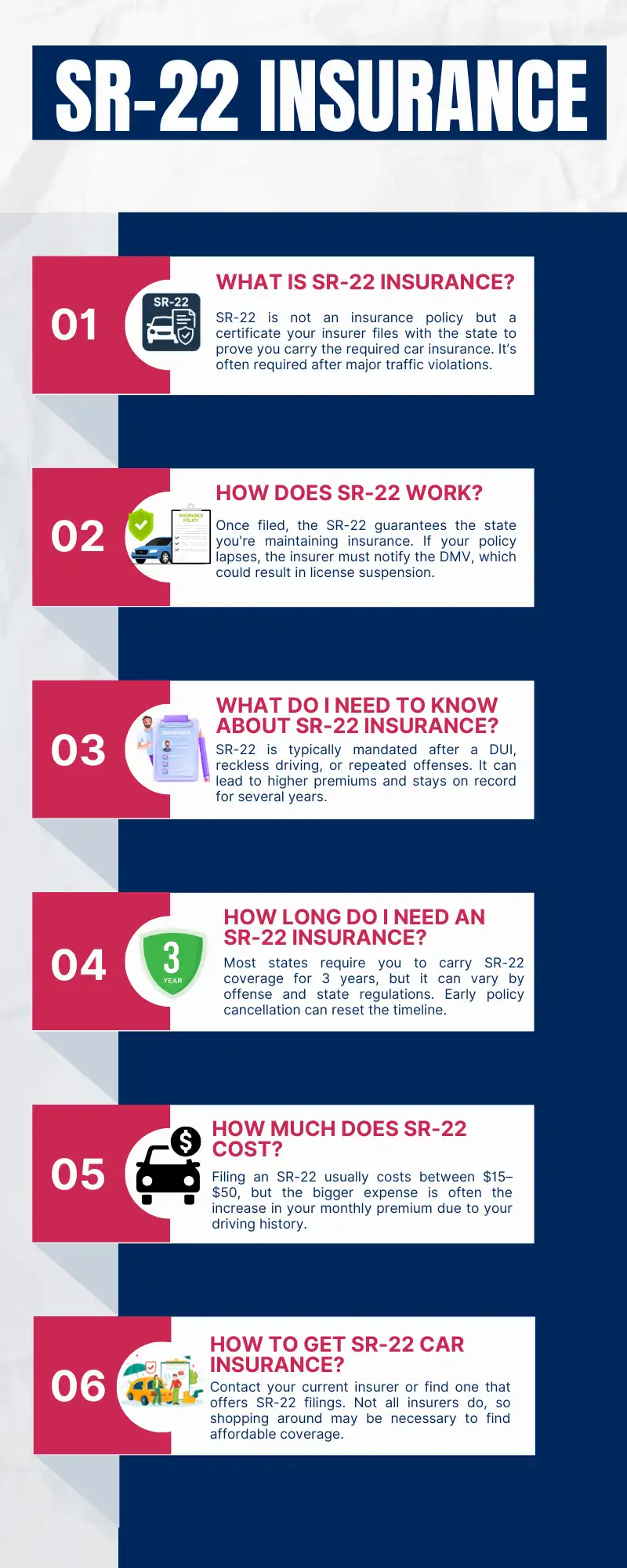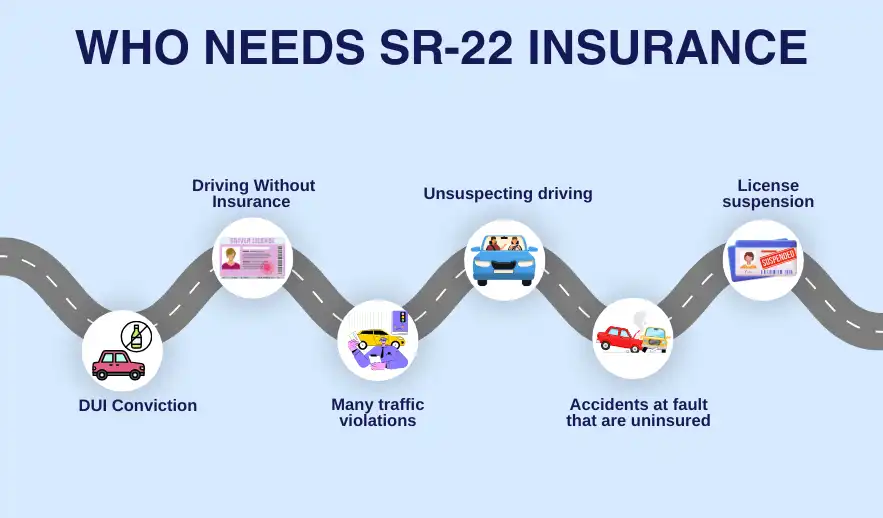Cheap SR-22 Insurance
Table of Contents

What is SR-22 Insurance?
Definition and Purpose
SR-22 insurance is not really an insurance policy, which isn't surprising, right? Instead, it's a declaration of financial responsibility, which the auto insurance company files with the State's Department of Motor Vehicles (DMV). It is a document that proves that you're covered by the minimum necessary insurance. In most cases, you'll need to get an SR-22 when you've been convicted of certain violations of driving. Consider it your golden ticket to get back on the road following an accident.
The reason for the SR-22 is to make sure that drivers with high risk are protected. In the absence of it in place, the DMV will not restore your driving license. The SR-22 informs the state that if you do not pay the premiums, or let your policy expire, they'll be informed immediately. This is like the insurance company notifying your DMV, "Don't worry, we'll be watching the situation."
How Does SR-22 Work?
The Role of the SR-22 Form
How does the whole SR-22 procedure work? Let me explain: Your insurer of autos submits the Form SR-22 directly to DMV. This is a method for the insurance company to verify your identity. This document proves that you've more than the minimal amount of liability protection required by the state in which you reside.
Imagine your SR-22 in the same way as an interim checker. In the event that the coverage lapses or drops the insurer has to notify the DMV usually within 24 or 48 days. It could mean being suspended from your license again. Therefore, if you're in the SR-22 clock, being on time with your payment obligations is vital.
The Filing Process is Handled by the DMV
After your insurer has filed the SR-22 and you're done, but not at this point. It is common to hear by the DMV of their receipt and approval of the application. The process can last from a couple of days or weeks, based on your state. At this point there is a possibility that you won't be able to legally drive until you have your license restored.
It's important to know that not all insurance companies offer the SR-22 form. A few high-end and low-cost firms aren't willing to accept drivers with high risk. So you'll be required to search a small amount to locate the one that will.
Impact on Your Driving Record
The SR-22 isn't a stain on your records, but what's the purpose behind why you should have one? It does. Criminal offenses that resulted in the requirement of SR-22, such as a DUI, can remain on your records for many years. Even though the SR-22 requirements may last only three years in some states, insurers will continue to increase rates based on past crimes long after the certification expires.
However, keeping good driving records while you're carrying an SR-22 in your file could help you. The evidence that you're an accountable driver can lower your rate in the future.
What Do I Need to Know About SR-22 Insurance?
Legal Requirements by State
This is the most difficult part: SR-22 laws are different for each state. In Ohio there is a possibility that you will need to keep an SR-22 for 3 to 5 years, depending on the offense. In California generally, the time span is 3 years. A few states such as Delaware and Kentucky aren't required to fill out the SR-22 in any way, whereas others such as Florida come with their own variant of the form.
The bottom line? Always consult your DMV or your local insurance agent. It's not a good idea to try and guess the SR-22 regulations. One error could put back years of your life.
Difference Between SR-22 and Regular Auto Insurance
Insurance for your regular vehicle is nothing more than protection. The premium is paid and is covered in the event that you are involved in an accident. Insurance for SR-22 is not separate from that, it's an additional insurance option that certifies to your state you're insured as a regular.
Another common issue is tickets, which is why Speeding Ticket Car Insurance is a must-read topic.

With SR-22, it's common to pay higher rates. It's as a "high-risk" driver that can result in higher prices. Additionally, your options for insurance may be limited based upon the type of companies willing to cover you.
Effects on Insurance Premiums
If you're deemed at risk, the insurance company will modify their rates to reflect this. Your premium could rise at least 50. However, certain drivers can get lower rates because of:
- Looking all around
- Choosing a higher deductible
- Bundling policy (like renters and auto insurance)
- Conducting defensive driving training
There is also the possibility of discounts as long as you have good standing after a conviction. The insurance companies are thrilled when you show improvement. It indicates that you're attempting to make things better.

Who Needs SR-22 Insurance?
It's not necessary for everyone to have an SR-22 policy, and frankly it's likely that you never need one. However, if you're obliged to have it the reason is usually due to an important driving violation. Below are some typical reasons for this:
- Cars without insurance
- DWI or DUI convictions
- Many traffic violations within a brief period of time
- Unsuspecting driving
- Accidents at fault that are uninsured
- License suspension or cancellation of license
If one of these scenarios occurs then the court or state's DMV may require that you file an SR-22 form prior to you being able to legally drive once more. This basically tells the police, "Yes, I'm back to normal, covered."
How Long Do I Need SR-22 Insurance?
State-by-State Duration
In general, states will have drivers maintain an SR-22 at least three years. However, it's not a universal policy. Examples:
- Texas: 2 years in Texas
- California: 3 years of California
- Florida: up to 5 Years
- Ohio: 3 to 5 years, based on the violations
Be sure to double-check the DMV of your state. Don't think you're not liable simply because it's been three years since you've passed.
Circumstances That May Extend the Requirement
If you let your policy lapse, your clock resets. If your SR-22 insurance is cut off, your insurance company informs the DMV the DMV, and the term of your SR-22 could start the process over. It could be 3 years of premiums that are high and surveillance.
The more serious of offenses, such as repeated DUIs or driving with no license, could result in a longer SR-22 term.
When and How to Remove the SR-22
Once your mandatory term is past, you may get in touch with your insurance company to inquire about an SR-22 cancellation. You shouldn't be expecting it to drop off on its own. It is necessary to fill out the proper form with the state of your residence and then confirm with the insurance provider to confirm that this form is not required anymore.
In the following months, you'll notice a decrease in your rates--again, a bit of breathing space.
Filing an SR-22 doesn’t mean you can’t still look for cheap car insurance in Pittsburgh.
How Much Does SR-22 Cost?
Filing Fees and Additional Costs
The expense of submitting an SR-22 is small, ranging from about $15 to $50, based on the insurance company you use and the state that you're located in. This is a single fee that the insurer will charge you to submit this form to the DMV. However, don't let it deceive you. What really costs you is afterward.
It's because an SR-22 generally follows a severe infraction, and that you're now a high-risk driver. In the event of a high-risk driver, your insurance premiums can rise dramatically. It's about the possibility of an increase of 40 percent up to 80% or more in your annual insurance premium according to the gravity of the crime.
Insurance Premium Increase
What do you think you'll pay? Let's take a look with a few rough estimates:
| Violation | Estimated Premium Increase |
|---|---|
| DUI/DWI | 60%-90% |
| Driving Without Insurance | 40%-70% |
| Reckless Driving | 50%-80% |
| At-Fault Accident | 30%-60% |
If, for instance, the cost of your insurance was set at $1,200 annually, that could increase to nearly $2000 annually when the SR-22 requirements kick into effect. It's an enormous hit to your budget, particularly when you're already facing costs for legal services and court fines or additional costs associated with the violation.
Tips to Reduce Your SR-22 Insurance Costs
There's good news for you: You're not dependent on the rules. There are ways you can reduce the cost of your SR-22 costs for insurance:
- Compare rates from several insurers. Some are specialized in drivers with high risk and provide lower premiums.
- Bundle your policies in case you also carry renters or home insurance. It can earn you discounts.
- A higher deductible results in more costs out of pocket when filing an event of a claim. However, it reduces the cost of your monthly premium.
- Get a defensive driver's course. A lot of insurance companies offer discounts to motorists who take part in certified courses.
- Make sure you have continuous insurance coverage. Don't allow your insurance policy to go unclaimed, otherwise your premiums will rise even more.
If you're able to use a little strategy and discipline, you'll be able to nevertheless find affordable SR-22 insurance that doesn't eat away at the budget.
See how SR-22 impacts policies in our full guide to auto insurance Pittsburgh.
How to Get SR-22 Car Insurance?
Finding an SR-22 Provider
Not all insurance companies are keen to sign up high-risk drivers. The first stage in getting an SR-22 insurance policy is to find an insurer that can provide the SR-22 filing service. Trustworthy insurers such as Dairyland, Freeway Insurance, Direct Auto, and others have a reputation for assisting people who require coverage for SR-22.
Begin by getting several quotes online or by contacting an agent. Certain insurers offer immediate SR-22 file, which could accelerate the process and help you get to the road quicker.
Steps to Filing for SR-22
Below is an easy step-by-step guide on how to get your SR-22 completed:
- Make contact with an insurance provider who is able to handle SR-22 claims.
- Inquire about an auto insurance policy (or change your current one).
- Make sure you pay the filing fee for SR-22 (usually $15 to $50).
- The insurer files an SR-22 form with DMV for you.
- You should wait for confirmation from the DMV to confirm that your driver's license has been renewed.
In some instances it is possible to purchase the non-owner SR-22 insurance even if you do not have a car. The insurance policy will cover you driving a vehicle that is not owned by you.
What to Expect After Filing
After you have submitted your SR-22 has been filed it is usually possible to be back on the road quickly. However, be aware that the DMV as well as law enforcement agencies are watching you closely. If you fail to pay a bill or decide to cancel your insurance policy, your insurance provider has to inform the DMV immediately. This could cause the suspension of your license.
What is the most important aspect? Make sure you are current with your monthly payments. One missed month could make your SR-22 obligation re-set or put you in more problems.
Frequently Asked Questions About SR-22 Insurance
1. What happens if my insurance company doesn't take out SR-22 Insurance?
If the judge or DMV requires you to file an SR-22 and you fail to do so, you'll be subject to the suspension of your license, fines, or even jail time. Your license will remain suspended until you comply. This isn't optional—it's a legal requirement.
2. What is the minimum time I should have to have SR-22 insurance?
Most states require you to carry SR-22 insurance for 3 years. However, it can vary. For example, Ohio may require up to five years depending on the offense. You must maintain continuous coverage during this period.
3. Do I have the option of removing the SR-22 condition earlier?
Usually, no. You are required to complete the full term unless the court or DMV explicitly shortens it. If you believe you've fulfilled the requirement early, contact your DMV to verify before canceling the SR-22.
4. What is the consequence if I allow my SR-22 insurance to expire?
If your coverage lapses or gets canceled, your insurer will notify the DMV. This can lead to an immediate license suspension and may reset your SR-22 period. To avoid setbacks, always stay current with your payments.
5. Can I get an SR-22 if I move to another state?
Many states have reciprocal agreements. If you move, your SR-22 requirement typically follows you. You'll need to file an out-of-state SR-22 to remain in compliance with your original state's mandate.
6. Can I switch insurance companies with an SR-22?
Yes, you can switch providers. Just make sure your new insurer files the SR-22 immediately to avoid a gap in coverage. Coordinate the cancellation and start dates carefully to keep your record clean.
Conclusion
Needing SR-22 insurance doesn't mean it's the end of the road. Yes, you've hit a bump, but this is also your chance to get back on track. Whether it’s due to a DUI, a lapse in coverage, or a bit of bad luck, the SR-22 can be your path to reinstating your license and reclaiming your freedom.
Sure, the costs are higher and the process may take time. But with smart planning, comparison shopping, and a positive attitude, affordable SR-22 coverage is within reach. Stay informed, drive responsibly, and remember—this is only temporary.